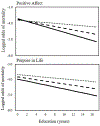Psychological well-being, education, and mortality
- PMID: 35157480
- PMCID: PMC9901287
- DOI: 10.1037/hea0001159
Psychological well-being, education, and mortality
Abstract
Objectives: Research on older adults often focuses on mitigating health risks, and less is known about protective factors that contribute to longer, healthier lives. We examine longitudinal associations between psychological well-being and mortality among a national sample of older adults and test competing hypotheses about whether the education/mortality association depends on the level of psychological well-being.
Method: We use six waves (2006-2016) of the Health and Retirement Study, a national sample of adults over age 50 (n = 21,172), with 14 years of mortality follow-up. Psychological well-being is measured up to three times and includes positive affect, life satisfaction, purpose in life, social support, and optimism. Discrete-time survival models examine (a) the association between time-varying psychological well-being and mortality, and (b) interactions between psychological well-being and education on mortality.
Results: Higher purpose in life, positive affect, optimism, social support, and life satisfaction predicted lower mortality. A 1 SD increase in most measures of psychological well-being was associated with a 2-4 year increase in life expectancy at age 50. Positive affect and purpose in life moderated the education/mortality association-the inverse association between education and mortality was stronger for those with high psychological well-being.
Conclusions: We find strong evidence that psychological well-being predicts lower mortality risk and modifies the association between education and mortality. The inverse association between education and mortality becomes stronger at higher levels of purpose in life and positive affect. Therefore, efforts to promote life satisfaction, social support, and optimism may support longer lives without widening education disparities. (PsycInfo Database Record (c) 2022 APA, all rights reserved).
Conflict of interest statement
The authors declare no conflicts of interest. The authors would like to thank Carol Ryff, Richard Rogers, and Ryan O’Connell for their contributions to this project.
Figures

References
-
- Arias E, & Xu J (2020). United States life tables, 2018. National vital statistics reports; vol 69 no. 12. National Center for Health Statistics. - PubMed
-
- Blaxter M (1990). Health and Lifestyles. Tavistock.

